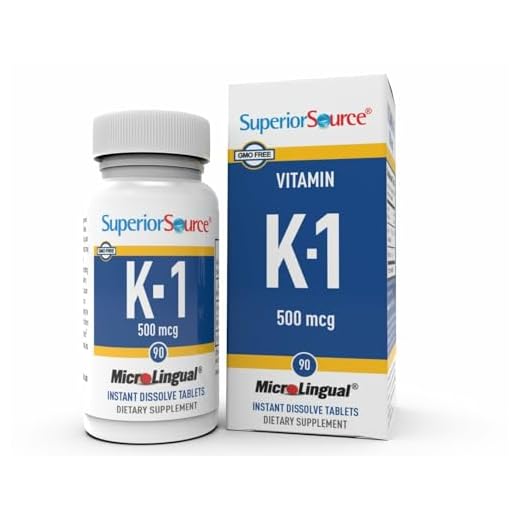







Vitamin K1 supports bone mineralization by activating proteins like osteocalcin, vital for binding calcium in your bones. It enhances the carboxylation of osteocalcin, reducing undercarboxylated forms that lead to lower bone density. Additionally, vitamin K1 promotes osteoblast activity, fundamental for bone formation and health. Research shows a positive correlation between higher vitamin K1 intake and improved bone mineral density, particularly in women. By inhibiting osteoclast activity, it further aids in maintaining bone strength. Ensuring adequate vitamin K1 in your diet can considerably impact your bone health, with more insights available on its role in overall mineralization.
Key Takeaways
- Vitamin K1 activates gamma-glutamyl carboxylase, essential for synthesizing osteocalcin, which binds calcium in bones for mineralization.
- Higher dietary intake of vitamin K1 correlates with improved bone mineral density and reduced fracture risk, particularly in postmenopausal women.
- Vitamin K1 enhances osteoblast activity, promoting the production of osteocalcin and supporting overall bone formation.
- It reduces undercarboxylated osteocalcin levels, indicating improved calcium metabolism and stronger bones.
- Vitamin K1 inhibits osteoclastogenesis, aiding in bone mineralization and maintaining bone density through regulating bone turnover.
Vitamin K Overview
When you think about essential nutrients for bone health, vitamin K1 often doesn't come to mind, yet it's important for maintaining strong bones. This fat-soluble vitamin, primarily found in green leafy vegetables, plays a key role in the carboxylation of osteocalcin, a protein that binds calcium in bones. By activating gamma-glutamyl carboxylase, vitamin K1 facilitates the synthesis of vitamin K-dependent proteins necessary for bone mineralization and overall bone strength. Additionally, vitamin K1 is fundamental for blood clotting and preventing bleeding disorders, highlighting its multifaceted role in health. Research shows that adequate dietary intake of vitamin K1 has a positive correlation with improved bone density, as noted in studies on functions and health benefits. Higher levels of vitamin K1 are associated with a lower risk of hip fractures, emphasizing its significance in preventing bone-related issues. The recommended dietary intake is 120 mcg for men and 90 mcg for women, making it clear that maintaining sufficient levels is essential.
A deficiency in vitamin K1 can lead to undercarboxylated osteocalcin, which negatively affects bone mineralization and greatly increases fracture risk. Thus, ensuring a diet rich in this nutrient is necessary for maintaining strong, healthy bones throughout your life.
Importance of Bone Health
Bone health is essential for overall well-being, impacting mobility, stability, and quality of life. Maintaining strong bones is critical to prevent issues like fractures, especially as you age. Vitamin K1 plays an important role in this process by supporting bone mineralization through the carboxylation of osteocalcin, a protein necessary for binding calcium within your bones. Additionally, vitamin K1 works synergistically with calcium and vitamin D to enhance bone strength, making it a key nutrient for skeletal health. Adequate dietary intake of vitamin K1 is linked to improved bone density and reduced fracture risk. For instance, the Nurses' Health Study demonstrated that women consuming less than 109 mcg/day of vitamin K1 experienced a higher incidence of hip fractures, underscoring the nutrient's protective role.
A vitamin K deficiency can result in undercarboxylated osteocalcin, which negatively impacts bone mineral density. To sustain ideal bone metabolism, it's imperative to meet the recommended intake of vitamin K—90 mcg for women and 120 mcg for men. Incorporating sufficient vitamin K1 into your diet not only enhances calcium binding but also greatly contributes to your overall bone health, safeguarding against the risks that come with weakened bones and increasing your quality of life. For more about the health benefits of vitamin K, check out its functions.
Vitamin K1 Sources
To support ideal bone health, it's important to know where to find vitamin K1, which is a key nutrient for bone mineralization. The primary dietary sources of vitamin K1 include green leafy vegetables such as kale, spinach, and broccoli. Incorporating these foods into your diet can help guarantee you're meeting the recommended daily intake, which is around 90 mcg for women and 120 mcg for men. Sufficient intake of vitamin K1 is essential for regulating calcium levels in the body, as it plays a central role in the production of osteocalcin, a protein vital for bone mineralization promotes strong bones.
In addition to these vegetables, certain fruits like kiwi and avocado, as well as vegetable oils such as soybean and canola oil, also provide vitamin K1. Increased consumption of vitamin K1-rich foods has been linked to improved bone mineral density and a lower fracture risk, highlighting their importance in a balanced diet.
It's worth noting that cooking methods can considerably affect the bioavailability of vitamin K1. For example, steaming your vegetables might retain more vitamin K compared to boiling them. As a result, pay attention to how you prepare your food to maximize the benefits of vitamin K1. By consciously including these dietary sources in your meals, you can effectively support your bone health and overall well-being.
Mechanisms of Vitamin K1
Vitamin K1 plays an essential role in the intricate processes involved in bone mineralization. It serves as a significant cofactor for the enzyme gamma-glutamyl carboxylase, which catalyzes the carboxylation of osteocalcin. This vitamin K-dependent protein binds calcium in bones, enhancing mineralization and directly contributing to improved bone mineral density. An adequate dietary intake of Vitamin K1 is associated with higher levels of carboxylated osteocalcin in the bloodstream, which can greatly reduce fracture risk.
Moreover, Vitamin K1 promotes the synthesis of matrix Gla-protein (MGP), another crucial protein that inhibits vascular calcification while supporting proper mineralization of bone tissue. Although the bioavailability of Vitamin K1 is lower than that of Vitamin K2, its contribution to maintaining sufficient levels of vitamin K-dependent proteins is undeniable. Observational studies suggest that a higher dietary intake of Vitamin K1 correlates with better bone health outcomes, underscoring its importance in osteoporosis prevention and reducing the risk of related fractures. By ensuring you include sources of Vitamin K1 in your diet, you can support these essential mechanisms for ideal bone health.
Osteocalcin and Calcium Binding
Osteocalcin acts as an essential player in the complex process of calcium binding within the bone matrix, and its functionality hinges on adequate levels of vitamin K1. This vitamin K-dependent protein, produced by osteoblasts, undergoes gamma-carboxylation, a critical modification that enables it to bind calcium effectively. When osteocalcin binds to calcium, it promotes bone mineralization, contributing to overall bone strength and density.
However, inadequate vitamin K1 levels lead to higher concentrations of undercarboxylated osteocalcin. This form is less effective at binding calcium and is associated with lower bone mineral density, greatly increasing fracture risk. Research has shown that sufficient vitamin K1 intake correlates with elevated levels of carboxylated osteocalcin, enhancing calcium binding and promoting ideal bone mineralization.
Moreover, vitamin K1 supplementation has demonstrated positive effects on osteocalcin levels, further supporting calcium metabolism. By ensuring adequate vitamin K1 in your diet, you can help maintain healthy levels of carboxylated osteocalcin, thereby promoting stronger bones and reducing the risk of fractures. Ultimately, understanding the relationship between osteocalcin and calcium binding underscores the importance of vitamin K1 in maintaining bone health.
Effects on Osteoblast Activity
Incorporating adequate levels of vitamin K1 is fundamental for enhancing osteoblast activity, which plays a key role in bone formation. Vitamin K1 promotes the proliferation and differentiation of osteoblasts, cells responsible for producing osteocalcin, a protein important for calcium binding and bone mineralization. When you guarantee sufficient dietary intake of vitamin K1, you activate specific signaling pathways that upregulate bone marker genes, including alkaline phosphatase, which is crucial for osteoblast function.
Studies consistently show that higher vitamin K1 levels correlate with improved bone density, indicating its significant role in maintaining bone strength. Additionally, adequate vitamin K1 helps reduce undercarboxylated osteocalcin levels. This reduction is essential because undercarboxylated osteocalcin is linked to increased bone turnover and reduced mineralization efficiency. By supporting osteoblast activity through vitamin K1, you enhance the overall mineralization process, which is vital for robust bone health.
Influence on Osteoclast Function
Effective bone health hinges not just on the activity of osteoblasts, but also on the regulation of osteoclasts, the cells responsible for bone resorption. Vitamin K1 plays an essential role in this regulation by inhibiting osteoclastogenesis, thereby supporting bone mineralization. It enhances osteoblasts' production of osteoprotegerin (OPG), which acts as a decoy receptor for RANKL (receptor activator of nuclear factor kappa-Β ligand). This interaction reduces osteoclast differentiation and activity, ultimately curbing bone resorption.
Research indicates that adequate levels of vitamin K1 lead to decreased serum levels of undercarboxylated osteocalcin (UcOC), suggesting improved bone formation and diminished resorption. Additionally, vitamin K1 has been linked to reduced activation of the NF-κB signaling pathway in osteoblasts, a key regulator of osteoclast function.
Higher dietary intake of vitamin K1 correlates with improved bone mineral density, particularly in postmenopausal women, highlighting its positive influence on osteoclast function and overall bone mineralization. By incorporating sufficient vitamin K1 into your diet, you can actively support the balance between bone formation and resorption, fostering stronger, healthier bones.
Evidence From Research Studies
How does vitamin K1 impact bone health at a molecular level? Research studies show that vitamin K1, or phylloquinone, markedly influences the carboxylation of osteocalcin, a essential protein for binding calcium in bones, thereby promoting bone mineralization. For instance, the Nurse Health Study found that women with higher dietary intake of vitamin K1 experienced a considerably lower risk of hip fractures, underscoring its protective role in bone health.
Additionally, observational studies indicate a direct correlation between serum levels of undercarboxylated osteocalcin—reflecting insufficient vitamin K1—and reduced bone density, leading to increased fracture risk. Meta-analyses have further demonstrated that vitamin K1 supplementation yields pronounced improvements in bone mineral density among postmenopausal women, reinforcing its crucial role in maintaining bone strength.
Moreover, research highlights that a higher dietary intake of vitamin K1 is associated with enhanced bone mineralization and lower bone turnover markers, suggesting a beneficial effect on overall bone metabolism. These findings collectively illustrate the importance of vitamin K1 in promoting bone density and reducing fracture risk, making it a significant nutrient for maintaining skeletal health.
Recommendations for Supplementation
Optimizing bone health through proper vitamin K1 supplementation is essential, particularly for those at risk of deficiency. Vitamin K1, primarily sourced from green leafy vegetables, plays a significant role in bone mineralization by activating osteocalcin. The recommended dietary intake for men is 120 mcg per day and for women, 90 mcg per day. If your dietary intake is limited or you have malabsorption issues, supplementation may be beneficial.
Research shows that higher vitamin K1 intake is linked to improved bone mineral density and reduced fracture risk, especially in postmenopausal women who are more susceptible to osteoporosis. If you're concerned about your bone health, consider evaluating your vitamin K1 intake.
However, if you're on anticoagulant medications, it's important to consult your healthcare provider before starting supplementation to avoid potential interactions. Overall, ensuring adequate vitamin K1 intake, whether through diet or supplementation, is essential for maintaining bone health and reducing fracture risk. Prioritize your bone health by understanding your individual needs and making informed choices regarding vitamin K1 supplementation.
Conclusion
In the intricate dance of bone health, vitamin K1 emerges as an essential partner, guiding calcium to its rightful place. By enhancing osteocalcin's ability to bind calcium and supporting osteoblast activity, it fortifies our bones like a master architect building a sturdy fortress. The research underscores its significance, urging you to contemplate supplementation as a shield against bone density loss. Embracing vitamin K1 is like adding a vibrant thread to the tapestry of your health, weaving strength into your very foundation.






